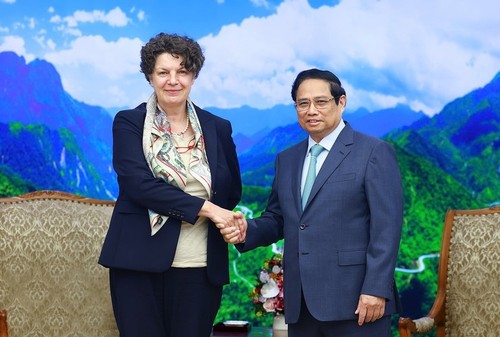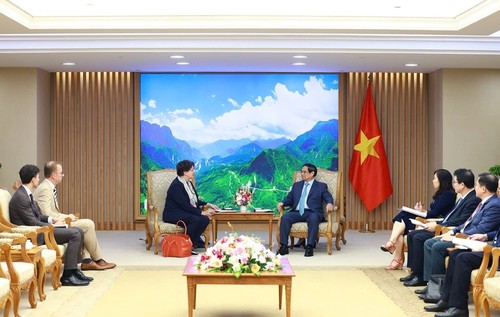 Prime Minister Pham Minh Chinh and new German Ambassador to Vietnam Helga Margarete, Hanoi, September 27, 2024. (Photo: VGP/Nhat Bac) Prime Minister Pham Minh Chinh and new German Ambassador to Vietnam Helga Margarete, Hanoi, September 27, 2024. (Photo: VGP/Nhat Bac) |
Currently, Germany is Vietnam's largest trading partner in the European Union (EU) with trade turnover reaching over 11 billion USD in 2023, and more than 8 billion USD in the first eight months of 2024, he said. Educational cooperation between the two countries is developing positively with more than 7,500 Vietnamese students studying in Germany and the Viet-German University project operating effectively.
PM Chinh thanked the German government for creating conditions for the Vietnamese community to live and work stably in Germany.
He suggested both sides take advantage of the opportunities of the EU-Vietnam Free Trade Agreement (EVFTA). He asked that the German parliament soon approve the EU-Vietnam Investment Protection Agreement (EVIPA), and that the European Commission (EC) soon remove the IUU “yellow card” imposed on Vietnamese seafood.
 (Photo: VGP/Nhat Bac) (Photo: VGP/Nhat Bac) |
PM Chinh highly appreciated the German Government’s provision of a large number of vaccine doses to Vietnam during the COVID-19 pandemic as well as Germany's support through multilateral mechanisms to help Vietnam overcome the consequences of recent typhoon Yagi.
Margarete affirmed that Vietnam is a key partner of Germany in the region, pledging to make every effort to promote relations between the two countries.
The Ambassador expressed her sympathy with the loss of life and property of the Vietnamese people due to typhoon Yagi, saying Germany would continue to support Vietnam through multilateral mechanisms.
Margarete praised the development of bilateral relations, and agreed to coordinate with Vietnamese agencies to carry out activities commemorating the 50th anniversary of diplomatic ties.
The diplomat spoke highly of Vietnam's role at international forums and expressed her wish to further promote cooperation between the two countries in all fields, especially education, training, skilled labour, and climate change adaptation.
The two sides heightened the basic principles of international law, and agreed in the need to resolve disputes by peaceful means and ensure security, safety, freedom of navigation and aviation in the East Sea, on the basis of international law, including the 1982 United Nations Convention on the Law of the Sea (UNCLOS).